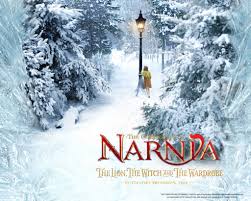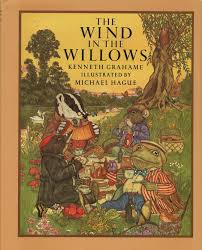via Inbox (165) – cpeek.cp@gmail.com – Gmail
2017 Christmastide Greetings from the Peeks
Dear Family and Friends,
Whoever you are, whatever you celebrate as a light in the darkness that cheers you, here’s a little poem to start off this reflection, found while reading the liner notes with a Maureen McGovern Christmas CD.
Entitled “Christmas Eve,” it was written by Robert Hillyer for his Poems for Music, 1917-1947. (I don’t believe it is on the cd)
Christmas Eve
The snow lies crisp beneath the stars,
On roofs and on the ground;
Late footsteps crunch along the paths,
There is no other sound
So cold it is the roadside trees
Snap in the rigid frost,
A dreadful night to think on them, —
The homeless and the lost.
The dead sleep sheltered in the tomb,
The rich drink in the hall;
The Virgin and the Holy Child
Lie shivering in a stall.
At odds, no doubt, with our commercialized and romanticized Christmas—but a stark reminder of the world into which God set aside divine privilege to come among us. (About which, more at the conclusion of this blog.)
Holiday Appeal
Possibly you already have plenty of places for your charitable giving, but just in case you are looking for a good cause, the Episcopal parishes of Central Nebraska are raising money to purchase a car for a priest now resident among us who recently fled the war and famine in Sudan and joined his family here. He is already giving pastoral ministry to the large Sudanese immigrant population in Grand Island, but is handicapped in assisting people who need help getting to doctors, jobs, schools, pharmacies, shops, etc. because he is without a car. Dinsdale Motors of GI is assisting us. If you want to help, send a check made out to St. Stephen’s Episcopal Church, the name Kuku in the legend, and mailed to Chuck Peek, 2010 5th Avenue, Kearney, NE 68845.
Family News
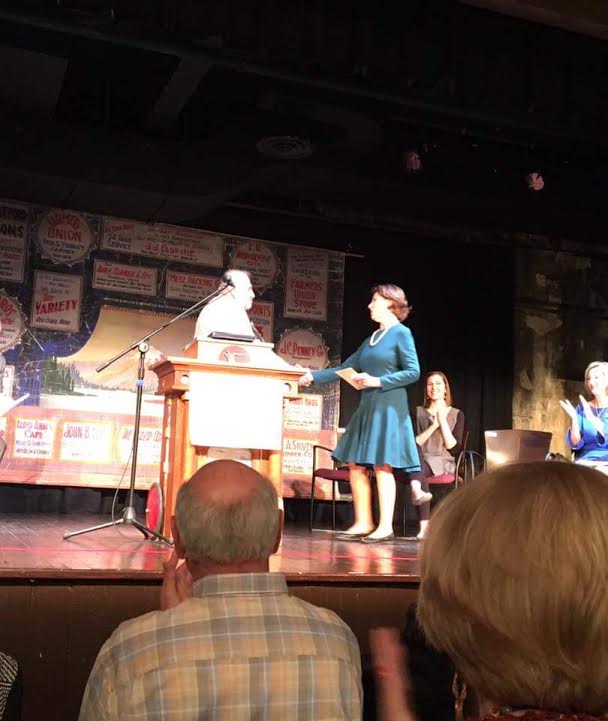
Chuck, Laura Bush, Ashley Olson and Lynette Krieger (Executive Director, Cather Foundation, and President, Cather Foundation Board of Governors at the Dedication of the new NWCC.
Lots has been going on in our little corner of Lake Woebegon since the Eastertide Reflections.
Chuck was chosen as emcee (and one of his poems chosen for the commemorative booklet) for the dedication of the new National Willa Cather Center in Red Cloud at which Laura Bush gave the main address. While she was in Red Cloud, she wanted to see the childhood home and the Cather Prairie—good choices, and her talk was informed and engaging. The only kerfluffle occurred when, while Mrs. Bush, her entourage, Cather family, and the steering committee to fund and build the center were waiting in the green room to come on stage, someone mentioned that the scissors to cut the ribbon were under the podium on the stage. There’s something about scissors that the secret service didn’t like! But, after considering who would be on stage with Mrs. Bush, they decided the scissor risk might be negligible.
Prior to the dedication, the Cather Foundation held another fine Spring Conference during which we offered our usual Holy Eucharist at Grace Church, Fr. Randy Goeke of Bassett, Nebraska, celebrating, Chuck preaching, Steve Shively (Utah State, Logan, Utah) assisting, and Nancy Savery (Lincoln) pumping the organ. (Next year, Randy will preach and Dean Craig Loya of the Cathedral is scheduled to celebrate.)
Then, quickly out to McCook for the Buffalo Commons Storytelling and Music Festival with a delightful storyteller, Kim Weitkamp, a teller of plains history, Jeff Barnes, and good music from, Frank Solivan and the Dirty Kitchen Band. Cloyd Clark, Mary Dueland, and Linda Crandall put on a first-class event and wonderful weekend. Very privileged to be part of it.
Sadly, we had to be back in McCook later on for the celebration of life for Nancy Towne, Linda Clark’s sister and a friend of ours and our daughters.
From McCook we flew to Pittsburgh for the wonderful Cather Seminar put on by James Japp and Tim Bintrim as well as the trivia night put on by Andy Jewell. Chuck gave a paper and we had a delightful dinner with Cather friends.
Pittsburgh gave us our first experiences with Uber, so positive we continued with Uber once we’d flown to Washington D.C. to celebrate his 70th birthday with Nancy’s brother Barclay and he and Lorita’s whole family: Barclay III, Keagan, Brian, Talon, Emma, and Collins; Pierce, Bryce, Brooks, and Cullen; and Sutton, as well as Peter Higgins. A wonderful celebration! While there, Lorita and Barclay III took us out to the Kennedy Center for a superb production of The Sound of Music for our anniversary.
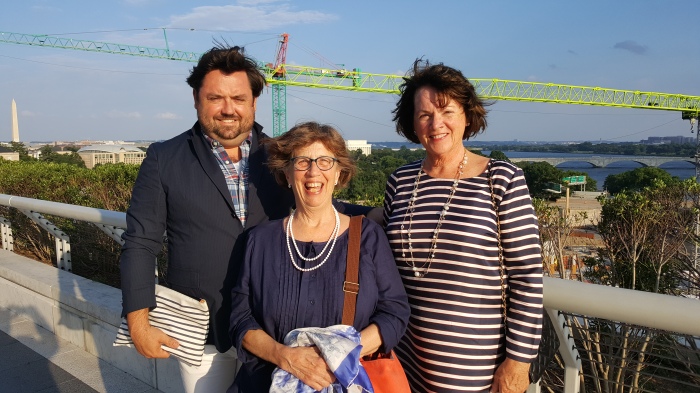
Windblown Barclay Resler III, Nancy, and Lorita Resler atop the Kennedy Center in Washington D.C.
Barclay II arranged for us to visit the new Smithsonian Museum of African American Culture, we got in a visit with each of their kids, and we had a fine brunch (crab cakes!) with Cynthia Caples and Cathleen Carothers.
Cynthia had been Cultural Affairs at the Consulate in Shenyang, the one nearest where we were posted in Changchun for our Fulbright post in 2005, and she was very, very good to us during our stay. Cathleen is currently with the State Department and slated to be head of Consular Affairs at the Embassy in Athens. We thought that veteran and current servants of the Republic might enjoy meeting each other and knew we’d enjoy getting to see them both. #OldEbbittGrill #CrabCakes.
After Barclay and Lorita left for the Cape, Barclay III took us around D.C. to see his old haunts and enjoy two dinners with him. All this took place just after Pierce and Bryce returned from two years in Australia and just before Sutton’s work took him to Japan and Barclay III’s work took him to Florida.
In D.C., we worshiped at St. John’s, Lafayette Square. We were saving a small pew in front of us incase we were joined by friends. A couple came in and started to take the pew until we explained that we hoped friends were joining us. They took the little pew behind us. We passed the peace with them during the Eucharist. When our friends had not joined us, we finally gave up saving the pew and someone else sat there. After the service, she greeted us and in the course of conversation it was clear she thought we must have known the couple who had taken the pew behind us. No, we said, we don’t. Why that’s Robert Mueller and his wife, she told us, adding: We pray for them every Sunday!
The Faulkner and Yoknapatawpha conference was a good one, highlighted by a brunch at Ann and Dale Abadie’s, a great chance to see friends Grayson Schick, Jim, Bev, and Cathleen Carothers, Colby Kullman and Jack Barbera, Jennie Joiner, Steve and Theresa Towner, and Terrell Tebbetts. Chuck took part in the Teaching Faulkner sessions for the 30th year running and his 34th F&Y conference.
On the way to Mississippi we stopped for Nancy’s annual iris check up with Dr. Alward at the university medical center (the same facilities where you may have seen on television how the children’s ward looks out on the football stadium where at some point in the game the fans stand and applaud the kids). Good report from that visit. We missed seeing friend Fr. Mel Schlachter this trip—he’s retired and so was too busy to be in town! But we did get to drive up to Waterloo to see George and Clara Day and then had a short visit with Fr. John and Kay Hall in Davenport before we swung south toward Oxford.
Also missed seeing my cousin Ted’s son David and his wife Jean in Sycamore—our planned visit had to be postponed for Jean’s surgery. But while there, we visited Maple Park and the farm now owned by Amie Rosinski but once owned by Nancy’s great-Aunt. We found the place with the good help of Judy and Sarah at Dekalb County Court House, and we enjoyed a brief visit with Amie.
From there, it was on to Milwaukee for our extended stay. Not only does the stay give us the chance to see our son and his family (together or separately) several times a week, but, this being our fifth summer doing this, it’s a little like a homecoming for us. We took in a play at a lovely theater we’d not been to before, an alternative rock concert in which Ramon Speed was featured, along with his friend Simon Joyner, and a boat ride around Oconomowoc and dinner after at a little alpine retreat with Laura Grace’s folks, Jon and Marty.
George continues to do some product liability law, along with lots of estate planning, real estate, and family law, and he continues as President of the Mount Olive LCMS school board, whose year’s highlight was the hiring of a new Principal. We got to see him in action as he spoke in Appleton to a group of professionals involved in estate planning. Laura Grace continues to sort out problems inherent in academic accreditation and enjoys working where her brother Jamie works, all this on top of being the mother of three—four if you count George! Will (9) is singing in Sancta Cantorum at their church, which performed at their 500th birthday of the Reformation observance. Greta (6) is now interested in all art and crafts on her way to becoming a farmer and lover of horses, and Huck (4) mastered the two-wheeler while we were there this summer and may soon suit up for the Packers.
Home just in time for Chuck to teach My Antonia for the Roads Scholar group in Red Cloud, get to the September meeting of the state Library Commission, and help Twyla Hansen and Ray Walton set up an October reading at the Bookworm in Omaha and a December reading at Mo Java in Lincoln.
As we settled into fall and fall headed toward winter, we enjoyed times with our “road trip” group: Ken and Linda Anderson (and Bev Nelson on a visit back to Kearney), Jack McSweeney and Janice Wiebusch, Carla Brooke, and Rosemary Northwall, some celebrations with Jerry and Janet Fox, Stan and Carol Dart, Steve Buttess and Jan Weber; and some lunches with Galen Hadley, Gene Koepke, and Dick Jussel. Many friends, including Delphine Sanks, took Kate Benzel’s class on Virginia Woolf’s Mrs. Dalloway together with us.
We’ve welcomed Mother Stephanie Swinnea and her husband Sam to St. Luke’s and are enjoying seeing how she is settling in as our new Rector. She led a fine class on Romans (the epistle, not the ancient people!). And we’ve had some good phone chats with Fr. Jerry Ness, our recently retired rector. Also, had the pleasure of welcoming into this world Maxwell Anderson, son of Michael and Michelle, grandson of Ken and Linda.
Chuck is enjoying being a commissioner on the Nebraska Library Commission, in which capacity he took in part of the Nebraska Library Association annual convention. Nancy is reading Alan Furst’s fine novels of intrigue in the Balkans between WWI and WWII, both of us enjoy Donna Leon’s Venice-set mysteries, and Chuck is having a great read of a book Ted Kooser recommended highly, Richard Flanagan’s Narrow Road to the Deep North. We’ve both enjoyed the Prairie Art Brothers “Front Porch Poetry” evenings at the Frank Museum, featuring poet friends Terry Schifferns, Paul Powell, Matt Mason, Twyla Hansen, Marge Saiser, among others.
We pray each day for the discernment of when to “Risk. Resist. Rescue. Reconcile,” and Nancy has been very busy with getting us to demonstrations for welcoming immigrants, trying to stop Betsy DeVos and company from ruining our state’s public schools and TransCanada from pre-empting Nebraska farm, ranch, and sacred land for a pipeline carrying toxic sludge to Texas for export. She’s active in Kearney Action Network, a group of savvy women organized by Janet Fox to keep up with issues and find where action can be effective. KAN works hand in hand with Ashley Weets’s Kearney Indivisible and other area groups.
As disappointed as we were with the three-member majority of the Nebraska Public Service Commission for giving the nod to the Keystone XL pipeline, we are very grateful for the two commissioners who took into account the interests of Nebraska’s land, water, and people and voted No…you two know what public service means! And believe me, the fight will go on, for now in the courts. This travesty will not become a reality!
The November focus weekend for the Bishop Kemper School for Ministry in Topeka went well. Chuck loves the program and students. He taught his course in Episcopal Church History and also offered a practicum on congregational leadership and self-care, and he’ll soon be grading the papers for this year. Dean Compier, Stacy Rohleder, and Deacon Robert Hurst do an excellent job of assembling us in short order into a Christian community of fellowship, learning, discernment, and worship.
Nancy headed up our hosting of Noelle, Harlan, Rowan, and Brody for Thanksgiving and our celebration of Brody’s 15th Birthday. Had a great weekend with them, highlighted by Rowan’s contribution of pheasant and spicy pickled eggs, Brody’s birthday cookie, Harlan’s discovery of our Espresso machine, and Noelle’s advice about Chuck’s blog, along with road-trip to the Sun Theater in Holdrege to see Branagh’s Murder on the Orient Express.
Harlan has had another stellar year as Superintendent of Cedar Bluff School, including getting Eric Crouch to give the pre-season football pep talk. Noelle directed the largest-yet Camp Canterbury, highlighted in part by Nebraska poet Matt Mason engaging the campers in story. She’s also the head of our planning for the Diocesan 150th Anniversary activities and finishing up a term as Warden of her parish. Rowan will finish his welding program at Mid-Plains Community College in North Platte in the spring with several welding certifications, i.e. with a career path! And Brody, almost as big as Rowan now, continues to excel in his studies and sports. He’s already getting letters from the Huskers, so he’s pretty excited about Nebraska’s new “Frost Alert”!
As I write today, after a great lunch at Mike Park’s International Food Truck, it’s hard to imagine needing to eat again, but there will be Runzas tonight at the UNK basketball games with Gregory Fox and then up soon: a trip to enjoy lunch with Cloyd and Linda Clark in McCook as we pick up our Christmas stollen from the Beiroc (shame on you Mary Hendrickson for addicting us to this! And welcome back to Nebraska). And holiday parties at Bobbie and Rachel Fox’s, Greta Sandburg’s, Steve and Mary Bennett’s, and the annual Godparents Christmas gathering at Dennis and Jo Nachtigals as well as hospitality and meditation at our Sunday Evening Prayer Group’s usual holiday gathering. December 7, Cather’s birthday, we both enjoyed the music and readings that Rex Walton organizes at the Church of Bill Kloefkorn (Mo Java Coffee Shop) in Lincoln.
We are preparing for Christmas with St. Luke’s “Advent in Narnia” program. Then, Christmas Eve we will be here for “Midnight Mass,” then off on Christmas Day to Cedar Bluffs, back here to prepare for the year’s turning and host the Milwaukee Peeks for a couple of days until we all converge back in Cedar Bluffs for New Years.
On deck: Chuck will be co-teaching a January class on Language for our Senior College with Stan Dart, Jerry Fox, and Dick Jussel, helping Mary K. Stilwell (Nebraska poet and editor of the new One Nebraska, One Book poetry anthology) to plan a program at Kearney Public Library, travelling to Omaha to be present for the kickoff of our Diocesan Sesquicentennial with an evening with our Presiding Bishop Michael Curry, and then back to Omaha to moderate a panel on social and religious tolerance to be held at Trinity Cathedral and offered as part of the Cather Foundation’s celebration of the 100th anniversary of the publication of Cather’s My Antonia. (Just in passing, last year’s One Book/One Nebraska was John Neihardt’s Black Elk Speaks, which has now sold over 1,000,000 copies.)
Also in January Chuck will be preparing a paper proposal for a Cather symposium in Ireland and a panel proposal (Peter Lurie, Theresa Towner, Sarah Gleeson-White) for the summer’s FY program, and Spring will see Chuck teaching Faulkner’s The Unvanquished for Senior College, in part using Digital Yoknapatawpha that Jim Carothers, Theresa Towner, and Jennie Joiner have worked on with Steve Railton.
Nancy will be helping with the spring events for KAN and preparations for the next round of elections; April will feature a Diocesan 150th Anniversary event in Kearney, as well as saying a sad farewell to Stephen and Caroline Price-Gibson; summer will see the opening of Mike Anderson’s new lakeside Cunningham’s where we hope to eat before June and July find us in Ireland with the Ptomeys, a side trip to Scotland and London, and with any luck a short stay at the Cape with Barclay and Lorita on our way home—but more of that when the Easter Reflections post.
Hope you and yours are reasonably (and seasonably) well and happy,
Chuck and Nancy
Correction Corner:
I sometimes take quotes from Anu Garg’s daily column, and mistakenly spelled the name ‘Gang’ in last Eastertide’s blog; my apologies.)
Closing thoughts:
40 years ago, preparing a group of half a dozen middle schoolers, I asked them to pause, reflect, and write a short answer to the question, “What kind of Messiah is Jesus?” I’ve kept over all these years only one of their short answers, the one that said, “A Messiah who knows what he’s talking about.” I’ve never been able to decide if the kid was evading an answer or the brightest theologian in the group!
I do know that most people don’t seem to even know what the Messiah was talking about! But this holy season gives us a clue, for it is the season for those whose faith may not yet be strong or well-formed but whose hope is great and, even in dark days such as ours, remains undiminished, and who might, from time to time, seek company.
A favorite hymn reminds us that this great festival of Light in Darkness comes “in the bleak midwinter.” I suspect, light only seems like light to us when we are aware of the dark. Bleak as have been some of the winters of my life, there has yet to be one when light didn’t shine.
When we took Nancy’s dad back to Arlington for burial, we just by happenstance walked up to the Washington National Cathedral in time to sit near the choir for the candle-lit Advent Festival of Lessons and Carols. The light did shine in the dark. Saved again by carols, I say!
There’s a similar moment at the close of a short piece in The Sun by Benjamin Hertwig. A former Canadian soldier from the war in Afghanistan is camping with Omar, a former detainee at Guantanamo, both trying to create a world where “a Muslim and a Christian can come back from war and become friends” (October 2017 p. 20). He tells us of Omar that, “On the frosted windows of his cell there was a thin, transparent edge through which he could catch a glimpse of the sun setting over the ocean.”
The “mysterious stranger” is always in the wings, about to come on stage!
For many years and still occasionally, I appeared in Christmas shows—plays at Kearney Community Theater or revues at Crane River. Pretty standard theater fare for the holidays: Miracle on 34th Street, A Christmas Carol, etc. Of all my stage roles, I think Scrooge was the most difficult. Because Scrooge is a symbolic character, it is easy to play him as mere caricature, forgetting in Dickens’s style that the character is essentially us until we are awakened by the reality of what the Messiah was talking about, the reality of which Christmas reminds us, the reality the Church is meant to instill.
Scrooge, before the visits, is a mean, heartless, hurt old bastard who has forged his own sad place in the world—of just the sort who now sits in the White House, surrounded by a clamor of support from people yet to experience the ghostly visitors and perhaps so dulled and despairing that the visitors won’t be seen when they come.
The lights are out in Bethlehem this year, but somewhere, the National Cathedral’s Advent Lessons and Carols are just around the corner, in someone’s cage a thin transparent slit lets through a sight of the sun, and in this season of light Nancy and I pray you might stumble into sights or sounds of this joyous season of profound light in deep darkness, of profound music in the midst of the noise so loud around us, that something may ring true for you in what the Messiah was talking about when he “knew what he’s talking about.”
(Photo, closing, and poem follow below…as they say, scroll down.)
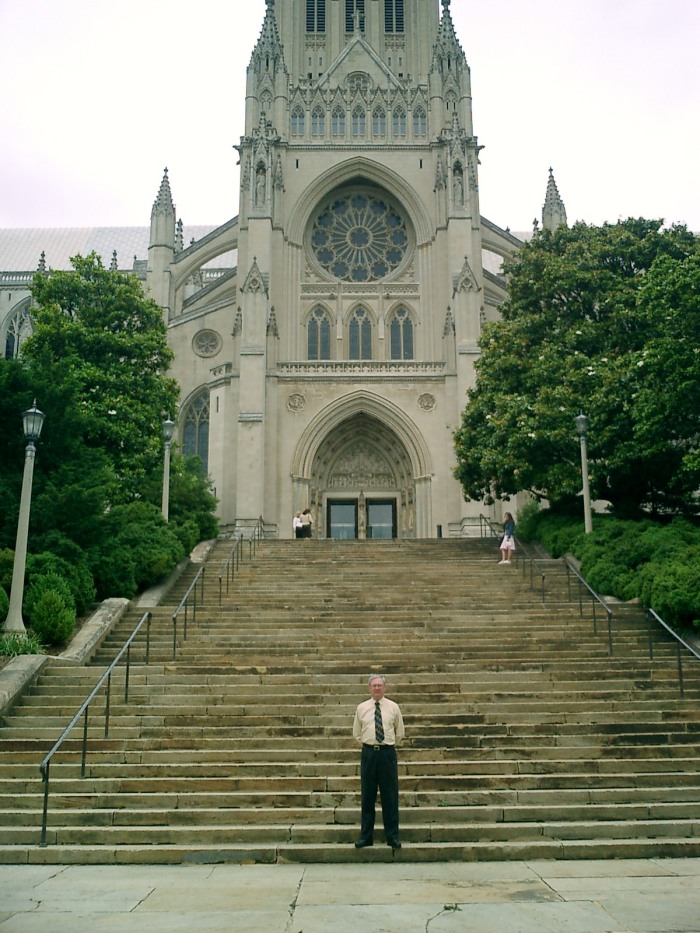
Our friend, Cather Scholar Steve Shively at Washington National Cathedral
Love to all,
Chuck and Nancy
PS
Our usual “Words of Wisdom” quotes, the necrology of deaths (friends and notables) since last Eastertide, and another poem will appear right around New Year’s as a separate blog, unless you are seeing this by snail mail, in which case they will be attached here. Meanwhile here’s a poem from a few years ago “resurrected” for new duty this Christmastide (#wordsmatter):
A Grave Christmas
Gerry Ford’s been buried four times this week,
And our ice storm didn’t cut off our power
Until the last pomp changed his circumstances
For good. There’s nothing either dour or jolly
About the Christmas tableau, no mere emotion of ours
Quite capturing the self-emptying of God.
We laid Ruth to rest, and Bud and Charlie,
Decked the halls of heaven with them all,
Commended them where love is the only ornament
Gracing the tree of life, we here fa-la-la-ing
Our way through the yet-to-be learned refrain
That follows, aware that the power outage
Does not dim the light by which we find our way,
And keeps us, amidst all the dying, merry and bright.
January 3, 2007
Kearney, Nebraska

